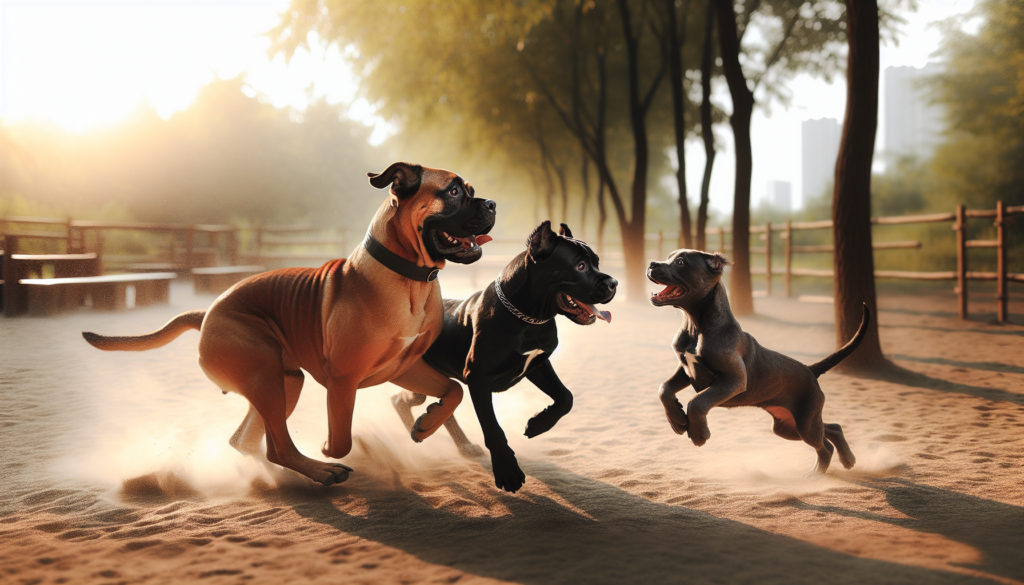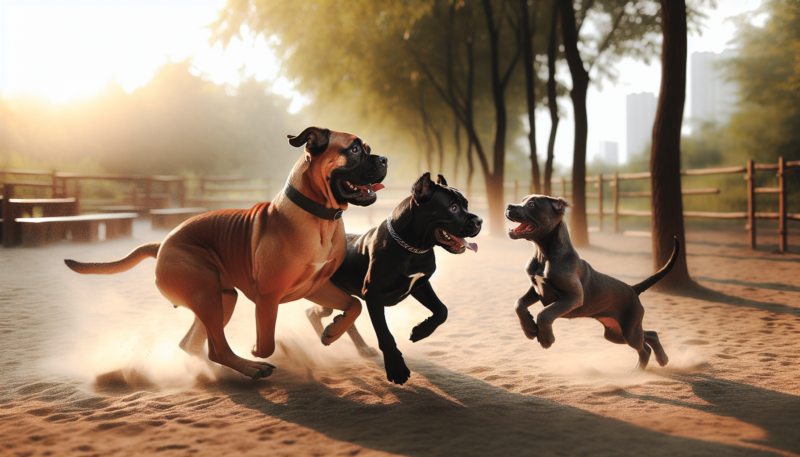Are you curious about whether Cane Corso dogs can socialize well with other dogs? Well, you’ve come to the right place! Whether you’re a current Cane Corso owner looking for tips on introducing your pup to new furry friends, or you’re considering bringing a Cane Corso into your multi-dog household, this article will provide insights into the social nature of these magnificent dogs. From their natural instincts to their training needs, we’ll explore how Cane Corso dogs can successfully interact with other canines and what steps you can take to ensure positive and harmonious socialization experiences.

Characteristics of Cane Corso Dogs
Cane Corso dogs are known for their imposing physical appearance and strong build. They are large and muscular dogs with a compact and athletic body. They have a broad head, strong jaw, and deep-set eyes which give them a stern and noble expression. Their coat is short and dense, and they come in various colors such as black, gray, fawn, and brindle. The Cane Corso’s temperament is another notable characteristic. They are loyal, confident, and protective, making them excellent guardians and family pets. Additionally, they have a high intelligence and can be easily trained.
Innate Tendencies of Cane Corso Dogs
Cane Corso dogs have certain innate tendencies that can influence their socialization with other dogs. One of these tendencies is their protectiveness, as they were originally bred as guard dogs. This can make them vigilant and cautious when it comes to unfamiliar dogs. Cane Corsos also have a dominant nature, which means they may try to assert themselves as the pack leader. Lastly, Cane Corso dogs have a prey drive, which may cause them to become overly interested in chasing small animals or even smaller dogs.
Factors Affecting Cane Corso’s Socialization with Other Dogs
Several factors can affect a Cane Corso’s socialization with other dogs. One such factor is genetics. While genetics cannot solely determine a dog’s behavior, it can influence their temperament and predisposition to certain behaviors. Early socialization plays a crucial role as well. Puppies that are exposed to various people, animals, and environments from a young age are more likely to develop positive social skills. Lastly, the owner’s training and socialization efforts are vital. Consistent training, positive reinforcement, and proper socialization techniques can greatly impact a Cane Corso’s ability to get along with other dogs.
Importance of Early Socialization for Cane Corso Dogs
Early socialization is of utmost importance for Cane Corso dogs. It helps them form positive associations and experiences with other dogs, people, and different environments. Through early socialization, they learn proper behavior and develop good manners when interacting with others. Positive experiences during this critical stage can shape their future behavior and ensure that they grow up to be well-adjusted and sociable dogs. Exposure to different environments also helps Cane Corsos become more adaptable, confident, and less prone to fear or aggression. Additionally, interaction with various breeds and sizes of dogs allows them to learn appropriate social cues and play styles.
Tips for Socializing Cane Corso Dogs
When it comes to socializing Cane Corso dogs, there are certain tips that can greatly aid in the process. First and foremost, it is important to start socializing them from an early age. The sooner they are exposed to positive interactions, the better. It is also crucial to use positive reinforcement techniques, such as treats and praise, to reward good behavior and make socialization a positive and enjoyable experience for them. Gradual exposure to other dogs is key, as it allows them to adjust at their own pace and become comfortable in different social settings. Supervised interactions with well-socialized dogs can further enhance their social skills. Lastly, structured socialization classes can be beneficial, as they provide controlled environments to learn and practice appropriate behaviors under the guidance of professionals.
Common Challenges in Socializing Cane Corso Dogs
While socialization is a vital process, it can come with its own set of challenges when it comes to Cane Corso dogs. One common challenge is aggression issues. Cane Corsos, if not properly socialized, may exhibit aggression towards other dogs, especially if they feel threatened or perceive a challenge to their dominance. Fear and anxiety can also hinder the socialization process. If a Cane Corso has had negative experiences or lacks confidence, they may become fearful or anxious in new social situations. Lastly, their protective nature can lead to overprotectiveness, where they may become overly defensive or possessive of their owners or territory.
Introducing Cane Corso Dogs to Other Dogs
When introducing a Cane Corso dog to other dogs, it is important to create a neutral territory where neither dog feels territorial or possessive. This can help reduce potential conflicts. Supervised encounters are essential to ensure the safety of both dogs and allow for immediate intervention if necessary. Gradual introduction is key to prevent overwhelming the Cane Corso or triggering any negative reactions. Allowing them to sniff and observe each other at a distance can help them become familiar before direct interaction. Additionally, it is important to pay attention to body language, as it can provide valuable cues about their comfort level and willingness to interact.
Recognizing Signs of Aggression or Discomfort in Cane Corso Dogs
Being vigilant and able to recognize signs of aggression or discomfort in a Cane Corso dog is crucial for their successful socialization. Raised hackles, where the hair along the dog’s back stands up, can indicate arousal or defensiveness. Stiff body posture, with a rigid posture and tense muscles, can signal that the dog is on guard. Growling or snarling are obvious signs of aggression and should be taken seriously. Hard staring or avoidance can be signs of discomfort or fear. Recognizing these signs allows for prompt intervention and appropriate action to prevent any potential escalation.
Training Techniques for Socializing Cane Corso Dogs
Proper training techniques can greatly aid in the socialization process for Cane Corso dogs. Obedience training is fundamental, as it helps establish a foundation of control and communication between the owner and the dog. Desensitization and counterconditioning techniques can be used to help the dog become more comfortable and less reactive in the presence of other dogs. This involves gradually exposing the dog to situations that may trigger anxiety or negative reactions while providing positive associations. Positive reinforcement, such as treats and praise, is crucial in reinforcing desired behaviors and creating a positive learning environment. In more challenging cases, behavioral therapy may be necessary to address deep-rooted behavioral issues.
Seeking Professional Help for Difficult Cases
In some instances, socializing a Cane Corso dog may require professional assistance. Consulting a certified dog trainer who specializes in behavior modification can provide expert guidance and support. They can assess the dog’s behavior, identify any underlying issues, and develop a customized training plan. Additionally, working with a veterinary behaviorist is recommended for more severe cases where the dog’s behavior poses a potential risk. They have extensive knowledge of animal behavior and can provide a comprehensive treatment plan, combining training techniques and, if necessary, medical interventions to address any underlying medical conditions.
In conclusion, while Cane Corso dogs have innate tendencies that can affect their socialization with other dogs, proper early socialization is crucial for their development into well-rounded, sociable pets. By following the tips and techniques mentioned, owners can overcome challenges and help their Cane Corso dogs become confident, well-behaved, and friendly members of society. Seeking professional help when needed ensures that any difficult cases are addressed appropriately. With patience, consistency, and positive reinforcement, Cane Corso dogs can indeed socialize well with other dogs and live harmoniously in a canine community.
